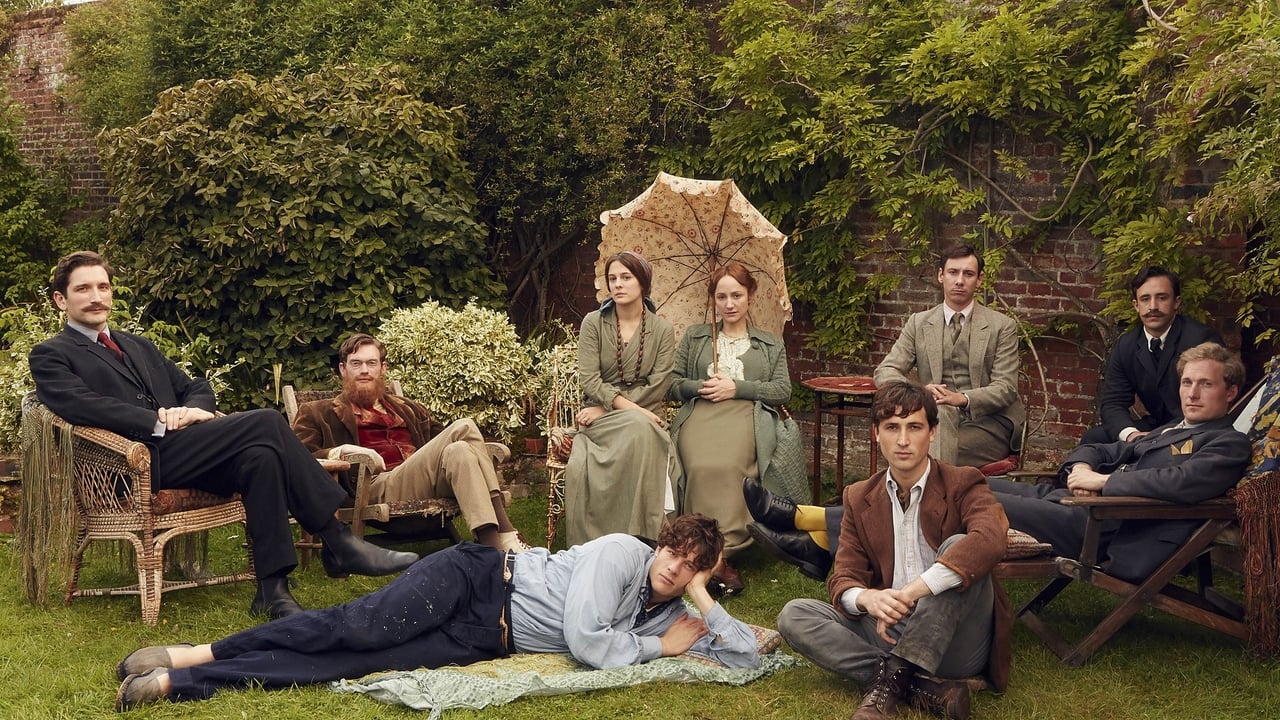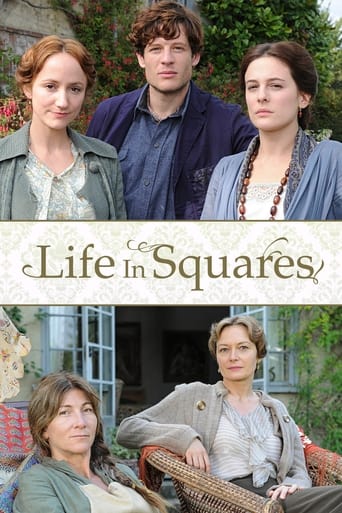TrueJoshNight
Truly Dreadful Film
Breakinger
A Brilliant Conflict
Sienna-Rose Mclaughlin
The movie really just wants to entertain people.
Jenni Devyn
Worth seeing just to witness how winsome it is.
l_rawjalaurence
Although I did not expect it, I found LIFE IN SQUARES to be a remarkable piece of television drama, offering insights into the lives of the Bloomsbury Group that I had never previously thought of.The title is a clever one, suggesting the bourgeois existence of the Stephen sisters Virginia and Vanessa (played by Lydia Leonard, Eve Best, Phoebe Fox, and Catherine McCormack across the three-episode structure) where they grew up in luxury, but also denoting imprisonment, both mental and emotional. David Roger's production designs, with elegant rooms heavily over-stuffed with curios of all historical periods, restrict the actors' freedom of movement; they are forced to move round chairs, or negotiate too many ornaments. When the Bloomsbury Group meet for their regular soirées, they do so in small, confined rooms, with little room to breathe.This kind of goldfish-bowl lifestyle inevitably has a significant effect on the Group's life-choices. While dedicating themselves to ideals of artistic purity that transcend the mundane concerns of early twentieth century Britain, we wonder whether that represents nothing more than a form of futile release from conformity. This is especially summed up in Vanessa Bell's checkered career; a talented artist in her own right, she becomes so much subject to her husband Clive's (Sam Hoare/ Andrew Havill's) bidding that she ends up losing her artistic will. She embarks on a long-term relationship with Duncan Grant (James Norton/ Rupert Penry-Jones), but finds little emotional satisfaction there - despite his undying devotion to her, he remains a professed homosexual.Virginia experiences equal pains. We know from the start that she is mentally fragile, but it seems that her sister's overbearing nature, coupled with the prevailing ideology that all wives should have children at that time, pushes her into marriage with Leonard Woolf (Al Weaver. Guy Henry), Although the two enjoy a tranquil and often fulfilling life, it is not what Virginia wants. She tries to find solace in her writing, but even that is not enough to prevent her from committing suicide at the outbreak of World War II. From this drama, we get the sense of terrible sorrow that such an innovator should have felt so hemmed in by social and mental pressures that she should take her own life.The sisters' existence does not change, even when they sacrifice London for the country, and Vanessa's family moves into Charleston, an idealized retreat still open to general visitors. Life there becomes even more claustrophobic, especially when Duncan's boyfriend David Garnett (aka Bunny) (Ben Lloyd-Hughes/ Jack Davenport) moves in. Vanessa is often forced into the role of unwilling peacemaker; at length she ends up doing something that she felt she must do, but ends up causing her lasting mental pain and suffering.What makes LIFE IN SQUARES such a game-changing piece is that its sympathy extends to male and female characters alike. Would-be critics like Roger Fry (Elliott Cowan) are trying to make their way in the world as they pronounce on the effect of Modernism on the post-1918 universe, but they appear to lack the conviction to do so. This is chiefly due to their environment; the hothouse world of London (and provincial) society is so insulated from from worldly affairs that it ends up feeding on itself.Brilliantly directed by Simon Kaijser from a script by Amanda Coe, LIFE IN SQUARES offers important material for reflection on the power as well as the limitations of the imagination, and how we must remain mindful of ourselves and our well-being rather than subjecting ourselves to the often restrictive dictates of prevailing socio-economic convention.
Sindre Kaspersen
Swedish television and film director Simon Kaijser's television miniseries which was written by English author and screenwriter Amanda Coe, is inspired by real events which took place in England in the early 20th century. It premiered on English television in 2015, was shot on locations in England and is a UK production which was produced by producer Rhonda Smith. It tells the story about a twenty-three-year-old author who was born in Kensington, Middlesex, London in England in the early 1880s.Distinctly and precisely directed by Swedish filmmaker Simon Kaijser, this quietly paced and somewhat fictional tale which is narrated by and mostly from the main characters' viewpoints, draws a perspicacious portrayal of a twenty-six-year-old sister. While notable for its distinctly atmospheric milieu depictions, cinematography by cinematographer Allan Almond, production design by production designer David Roger and costume design by costume designer Claire Anderson, this dialog-driven and narrative-driven story about English history which was made a century after an English painter named Vanessa Stephen Bell (1879-1961) and a Scottish painter from Rothiemurchus, Aviemore, Scotland named Duncan Grant (1885-1978) arrived in Charleston, Sussex, England (1916), depicts several interrelated studies of character and contains a great and timely score by composer Edmund Butt.This conversational and cinematographic retelling which is set in England in the early 20th century more than a century after a photograph called "Julia Jackson" (1867) and where poets and painters create a group, is impelled and reinforced by its cogent narrative structure, substantial character development, rhythmic continuity, comment by Leonard: "Our whiff of shot in the cause of freedom." and the reverent acting performances by English actresses Lydia Leonard, Phoebe Fox, Catherine McCormack and Eve Best. An androgynous miniseries.
ceri-edwards2
I recorded this mini series because being a fan of Woolf's writing and being interested in Keynes I was interested in the topic. I delayed watching it because of the potential for lascivious sexism and cliché I have observed in other artistic works regarding the Bloomsbury set. I started watching it when I was ill and was gripped. I like the way the author focused on Vanessa Bell and the avoidance of sexist representations of the women, as is so often the case, especially where there is a break from accepted relationship convention.I was so glad the author just introduced some characters by name and didn't over explain who everyone was and list their achievements. Unlike a previous reviewer I was glad the snobbishness and self importance and flaws of individuals was not written out. I particularly enjoyed the inclusion of angelica's experience. This took the examination of the group far beyond previous works I have encountered, giving the story some real emotional meaning.Over all this series seemed to me to be an exploration of relationships. It reminded me of Phillip Larkin's poem of parenthood.
ccookiemail
It's part two of Life in Squares tonight about the Bloomsbury Group and Virginia Woolf on BBC2 tonight at 21.00. In the first episode we romped through nearly ten years and saw how the embryonic group grew out of some Cambridge male graduates in the modern Bohemian squares of Bloomsbury. They were young free and single and OK. for money and everything was exciting. We saw how the complex relationships of Vanessa (nee Stephen) Bell, Virginia (nee Stephen) Woolf and the death of Thoby Stephen who brought the group together for their Thursday evening meetings. Painter Vanessa Stephen and her writer sister Virginia embarked on a life of unexpected and emerged from the whaleboned strictures of Victoria England. It was a remarkably accurate portrayal and covered a lot of ground in a short hour long program. I loved the lighting and treatment of some difficult subjects which set up tonight's second episode for an exciting continuation.

